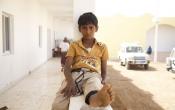Sudan
Operation: Sudan
Location
{"longitude":30,"latitude":14,"zoom_level":5}
Latest update of camps and office locations 21 Nov 2016. By clicking on the icons on the map, additional information is displayed.
Key Figures
| 2017 planning figures | |
| 209,920 | people of concern registered on an individual basis |
| 1,300 | best interest assessments (BIAs) will be conducted for children of concern to UNHCR |
| 940 | resettlement registration forms (RRFs) will be submitted to resettlement countries for a total of 2,310 individuals |
| 350 | businesses will be registered as part of livelihoods interventions |
| 2015 end-year results | |
| 953 | refugees departed for resettlement from Sudan, 29% of which were women and girls at risk |
| 65% | primary school-aged children were enrolled in primary school |
| 68% | households were living in adequate dwellings |
| 39,470 | refugee returnees were registered and assisted by UNHCR |
Latest Updates and Related Links
People of Concern
50%
Increase in
2015
2015
| 2015 | 3,735,966 |
| 2014 | 2,498,776 |
| 2013 | 2,083,649 |

[["Refugees",309639],["Asylum-seekers",12581],["IDPs",3218234],["Returned IDPs",152663],["Returned refugees",39494],["Others of concern",3355]]
Loading ...
Budgets and Expenditure for Sudan
< Back
2015
{"categories":[2012,2013,2014,2015,2016,2017],"budget":[133.84220317,116.72969403,160.308285897,171.322796876,167.16551603,150.463598289],"expenditure":[54.31417811,50.57392511,68.4190138,70.93360276,null,null]}
{"categories":[2012,2013,2014,2015,2016,2017],"p1":[76.56904123,70.71228347,115.474342387,137.778614176,135.01861321,114.638498635],"p2":[5.92647297,3.80925251,3.36070081,3.0773447,1.54826576,2.600986706],"p3":[null,null,null,null,null,6.313447],"p4":[51.34668897,42.20815805,41.4732427,30.466838,30.59863706,26.910665948]}
{"categories":[2012,2013,2014,2015,2016,2017],"p1":[28.37723597,30.00781492,45.14173249,57.11940336,null,null],"p2":[3.55755501,1.73839136,1.80628898,0.56779169,null,null],"p3":[null,null,null,null,null,null],"p4":[22.37938713,18.82771883,21.47099233,13.24640771,null,null]}
Loading ...
CHOOSE A YEAR
- 2014
- 2015
- 2016
- 2017
Working environment
The operational environment in Sudan remains challenging. Sudan is a source, transit and destination country for asylum-seekers, refugees and migrants travelling along the eastern African migratory route to North Africa and thereafter to Europe. Ongoing internal conflict in the peripheral regions of the country remains of significant concern. The continued economic deterioration in Sudan also negatively impacts the already vulnerable refugee population, which has limited access to formal employment. In addition to the large South Sudanese refugee population already in the country, the renewed conflict in Juba in July 2016 also triggered further refugee flows to Sudan.The Government of Sudan has an “open door” policy for asylum-seekers, providing land for the establishment of refugee camps and allowing refugees to access host community services such as education, health and water facilities. In addition, the Government has allocated land for the establishment of reception centres for new arrivals in the East, as well as in White Nile and Darfur.
Key priorities
Life-saving protection and assistance services which will be strengthened and prioritized in 2017 include:• improved access, reception, registration and documentation;
• camp management and coordination; and
• basic services including shelter, health, nutrition, water and sanitation, and primary education.
In addition, UNHCR will work to consolidate gains made in 2016 in terms of key strategic objectives, including continuation of the “Strategy to Address Human Trafficking, Kidnappings and Smuggling of Persons in Sudan – Strengthening Alternatives to Onward Movements (2015-17)” jointly developed by UNHCR Sudan, IOM, UNODC, UNICEF and UNFPA and the renewed self-reliance programme that aims at enhanced economic self-reliance, reduction of aid dependency and promotion of sustainable co-existence between the refugees and host communities
In the event of a funding shortfall, the ability of the Office to maintain existing services and assistance for people of concern will be impacted. Maintenance and rehabilitation of facilities and sanitation and waste management services in the refugee camps will be significantly affected. Inadequate funding will have dire consequences on the overall protection and well-being of refugees both in camps and in the ‘open areas’ as well as that of IDPs. Funding shortfalls may also result in refugees relying on negative coping strategies, including irregular onward movements to Europe in search of better opportunities.






